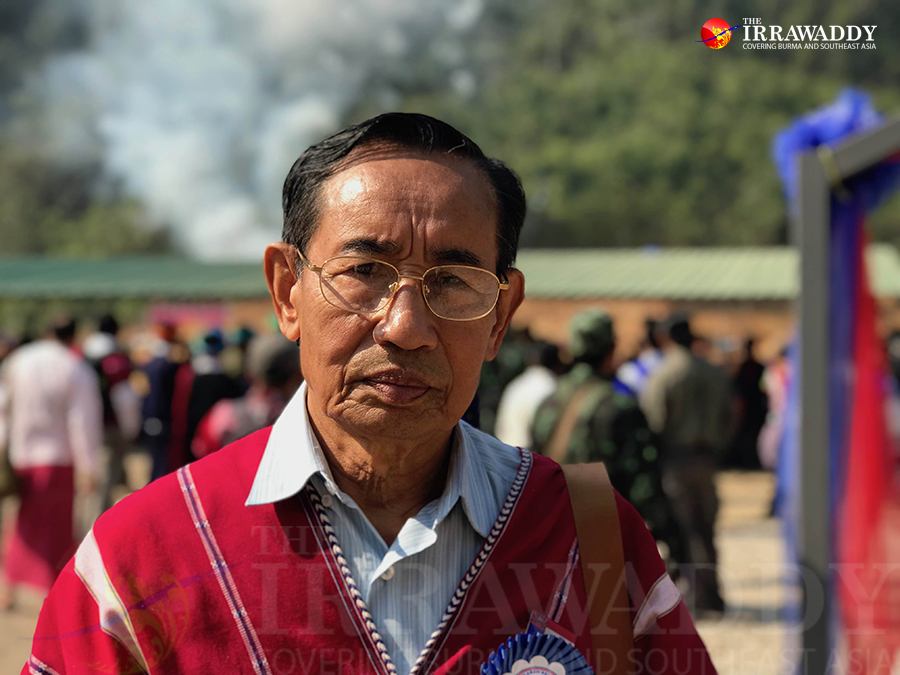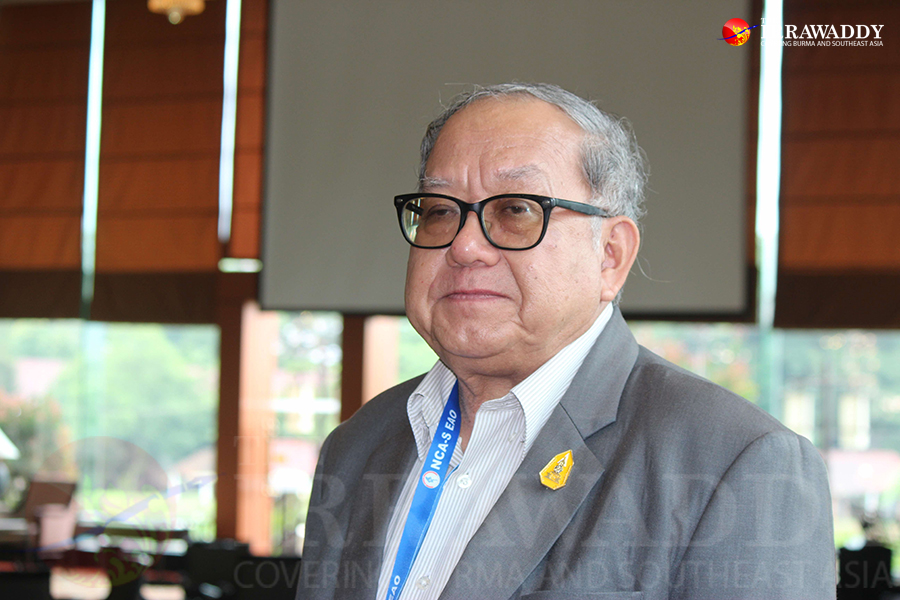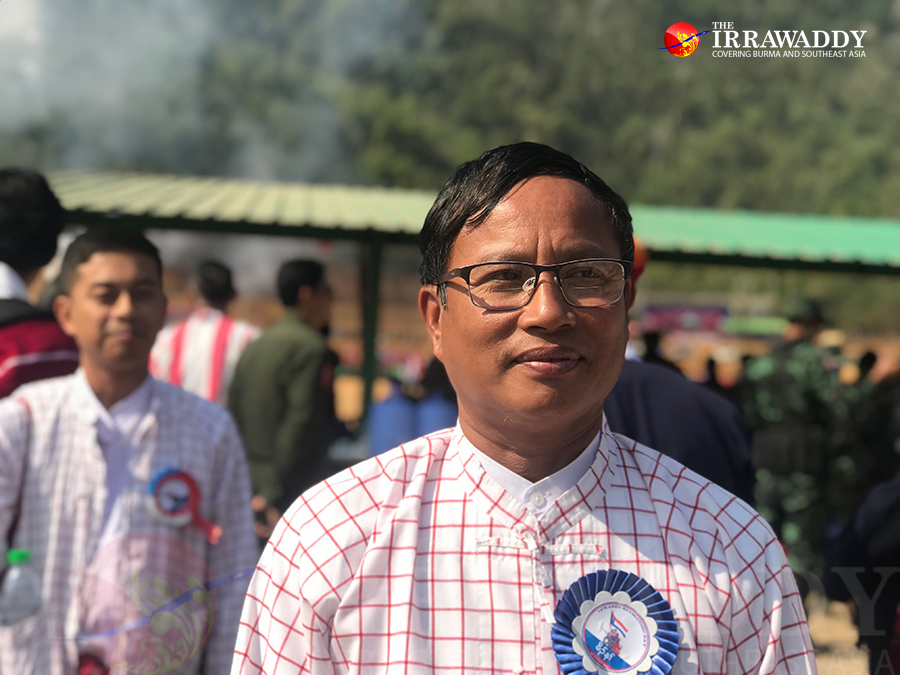CHIANG MAI—Senior leaders from ethnic armed organizations (EAO) pleaded for an end to the current fighting in Myanmar’s northeast, calling on both the government and the three EAOs involved in the fighting to negotiate an end as soon as possible.
It has been a week since an alliance of the Ta’ang National Liberation Army (TNLA), the Arakan Army (AA) and the Myanmar National Democratic Alliance Army (MNDAA) launched attacks on police outposts and a Myanmar military, or Tatmadaw, training facility in townships in Mandalay Region and Shan State.
Those attacks killed 15 people, including civilians, soldiers and police, and the resultant fighting has displaced thousands.
On Aug. 15, rebels targeted the military’s Defense Service Technological Academy, in Pyin Oo Lwin Township, Mandalay Region, as well as security outposts, anti-narcotics checkpoints, toll gates and bridges in Naung Cho Township, in Shan State.
The government denounced the attacks as “terrorist acts” last Friday but said it remains open to dialogue.
“The country has been sunk in conflict,” said Mahn Nyein Maung, the Karen National Union’s (KNU) senior Central Executive Committee member.

Many EAOs in southern Myanmar have signed a national ceasefire agreement (NCA) with the military, and the military declared a unilateral ceasefire in the north and northeast of the country eight months ago. But, Mahn Nyein Maung said, the new fighting worsens the situation in already troubled areas.
“It really has bad consequences for our country. It needs to stop, and I can say from my own experience that these conflicts cannot be solved with arms,” he said. “Only when we all come to the table for political talks will we help our people, as well as our country, so both sides must quickly try to meet.”
The KNU signed the NCA in October 2015 with seven other EAOs. Two other groups—the New Mon State Party (NMSP) and the Lahu Democratic Union—signed last year.
“I’d say, in my experience, when it comes to political negotiations, groups may have different views and sometimes feel insulted by negotiating partners, but the negotiators must not despair and instead make compromises to overcome these challenges,” Mahn Nyein Maung said.
Before the NCA was signed, the military had dismissed the three groups from participating the peace process, as they are newcomers and has demanded them to disown armed struggle. When the three groups made their announcement to lay down their arms and seek political solution in December, the military truce followed.
The TNLA, AA and MNDAA were part of a 16-member nationwide ceasefire coordination team that led to the drafting of the NCA text back in 2014 and 2015, but in 2015 they were not invited to sign the NCA. The military, viewing them as newcomers to the process and to armed struggle, dismissed their demands and ordered them to disown the struggle.
Khun Okkar of the Pa-O Nationalities Liberation Organization, the political wing of a Pa-O EAO, said the rebel attacks highlight that “their existence also must be recognized.”

“In four years of not being invited to the peace process these groups have managed to increase their military strength and build momentum toward war. No blaming or pointing fingers, but they wanted to prove that their affairs matter too,” Khun Okkar said.
He said he was surprised when the United Wa State Party recently said the three are not their military allies.
Khun Okkar said current tensions could last at least until the end of the year, hurting trade in northern Myanmar and damaging the China-Myanmar Economic Corridor project.
“We don’t know exactly what [the three EAOs] want, but with the disruption to the current trade routes and possible damage to Chinese-led projects, they may be seeking China’s attention.”
The current conflicts in northeastern and western Myanmar are similar to what happened in southern Myanmar for seventy years, said Nai Ong MaNge, the NMSP central committee member.
“But previous military operations were mostly in the jungles, and many people in urban areas were not aware,” he said. “Now it is happening in the areas near cities [and trade routes], and more people are coming to realize the problem.”
Nai Ong MaNge also voiced support for a political rather than military solution. If political dialogue can guarantee the equality of all people and recognize the rights of ethnic minorities, he said, it will help end the fighting.

He said one way to overcome differences would be by “expanding the political dialogue framework by allowing every EAO, regardless of their NCA signatory status, to participate in the political dialogue and to create a space for everyone.”
The government is currently trying to update the existing framework and hoping to convene a Union Peace Conference before 2020.
Ethnic leaders interviewed for this story said the military must reduce its armed engagement and the Union government must treat every ethnic group equally, regardless of the size of their territories and populations or their military strength.
The NMSP signed the NCA in February 2018 and has been working on regional development and access to healthcare and education for the local population at home.
But, Nai Ong MaNge said, they still don’t feel any more recognized than in the past 24 years.
The NMSP signed their first ceasefire with the then military junta in 1995. In 2012 they had bilateral, Union-level ceasefires with the quasi-civilian government of the time. They signed the current NCA under the current National League for Democracy-led government.
“But it is becoming very difficult to do our activities and engage with the local people and civil society groups, or to hold political talks [in Mon state],” he said.
Even though the NMSP signed the NCA and there is no fighting, he said, “we also cannot form the state-level Joint Ceasefire Monitoring Committee—an NCA implementation body—in Mon State.”
“If one ethnic group feels they are treated unequally and not recognized because they don’t have a lot of weapons, we’re worried this pushes people into a corner where they think they must further arm themselves and strengthen their armies,” Nai Ong MaNge said.
“If the government can’t persuade us, it’s easier for the ethnic people to join hands in armed struggle. More restrictions, more negligence and more of us feeling we are not getting what we want will push us into a corner we’ll have to fight our way out of,” he said.
“When solutions are obtained through negotiation and a federal union guarantees equality and self-determination, we can reduce fighting,” he said. “If not, we’ll be stuck in a cycle of armed conflict.”
You may also like these stories:
At Talks in China, Beijing Urges Myanmar Rebel Groups to Stop Fighting
Will Myanmar’s Formal Peace Negotiations Get Back on Track?
Rebel Fighters Attack 2 Towns in Myanmar’s Shan State

















